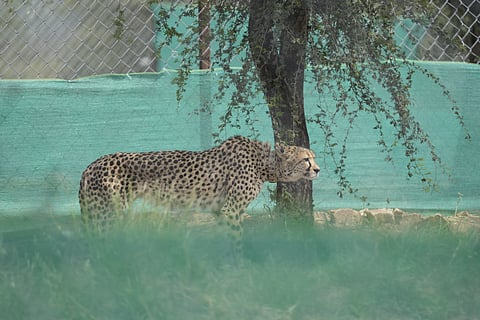

A latest paper by experts from the National Tiger Conservation Authority (NTCA) and the Protect Tiger has debunked growing criticism surrounding Project Cheetah, India's most ambitious species reintroduction programme.
Published in the Frontiers in Conservation Science Journal, the study titled “Beyond Rhetoric: Debunking Myths and Misinformation on India’s Project Cheetah” responds to concerns raised about cheetah mortality, displacement of local communities, animal welfare, and veterinary capabilities.
The authors argue that many of the critiques stem from “ideological bias, selective data use, and omission of key facts,” and insist that the project is progressing in line with global conservation benchmarks. Addressing the issue of animal deaths, the study states that some level of mortality is natural in any wildlife translocation effort.
Between 2023 and mid-2025, adult cheetahs in Kuno National Park have shown survival rates of 70 per cent in the first year and 85.7 per cent in the second year. Of the 21 cubs born, 14 survived, a 66.67 pc cub survival rate, considered encouraging for a species known for high early-stage mortality.
As of May 2025, Kuno is home to 31 cheetahs, suggesting that the introduced population is stable and growing.
The study analysed what it called ‘the frequent misapplication of the term captive,’ referring to the introduced cheetahs at Kuno National Park. While the World Association of Zoos and Aquariums defines captivity as the confinement of animals in man-made enclosures with reliance on human care, the cheetahs in Kuno are neither held in artificial structures nor dependent on human provisioning, the paper explained.
“Instead, they were initially held in softrelease bomas (SRBs) with access to an adequate locally available prey base. These SRBs are fenced natural habitats within the larger Kuno landscape, allowing the cheetahs to hunt independently and exhibit natural behaviors while acclimatising to their new environment. This soft-release model is not only an internationally recognised best practice for carnivore reintroductions but has also been shown to increase the odds of reintroduction success by 2.5-fold,” the experts pointed out.
Responding to allegations of human rights violations, the NTCA study clarifies that no local community has been forcibly relocated for Project Cheetah. Only one village has been resettled since 2023, and this was done voluntarily, with gram sabha approval and in accordance with the Forest Rights Act and Wild Life (Protection) Act.
The resettlement package included agricultural land, housing support, access to schools and healthcare, and five years of post-relocation assistance. “Contrary to claims, the project offers improved socio-economic opportunities,” the paper notes, adding that many villagers have found employment in conservation and eco-tourism roles.
The study also addresses concerns around the number of veterinary interventions. It says that the 90 reported immobilisations, roughly two per animal per year, were essential for medical checks, radio-collaring, and other routine procedures. All were conducted by trained wildlife veterinarians.
A Disease Risk Analysis was carried out before the cheetahs arrived, and no deaths linked to those assessed risks have occurred so far. A modern veterinary facility has also been established in Kuno to ensure timely treatment and long-term care.
The authors argue that commentary by non-veterinary critics on medical procedures “lacks scientific merit” and fails to account for standard field realities in wildlife management.
The paper criticises what it calls a narrow focus on individual animal suffering, without considering broader ecological benefits. It points out that South Africa’s own cheetah populations were re-established through similar reintroduction efforts decades ago.
The NTCA notes that translocation survival rates differ across regions, with global figures ranging from 0 pc to 85 pc. In that context, India's current rates are “well within acceptable ranges,” the study states.
The NTCA is preparing additional sites for cheetah reintroduction, including Banni Grasslands in Gujarat and Gandhi Sagar Wildlife Sanctuary in Madhya Pradesh. Talks are underway with Namibia, South Africa, and Botswana to bring in more cheetahs to ensure genetic diversity.
While acknowledging that species recovery is a long-term effort with inevitable challenges, the paper maintains that Project Cheetah is on a promising track. It calls for “constructive engagement over selective criticism” and affirms India’s commitment to restoring the cheetah to its historical range.
The paper was authored by Sanath Muliya, Vaibhav Mathur, Hemant Singh, Abhishek Kumar, Sanjayan Kumar and Gobind Bhardwaj, from NTCA, Project Tiger and National Zoological Park.